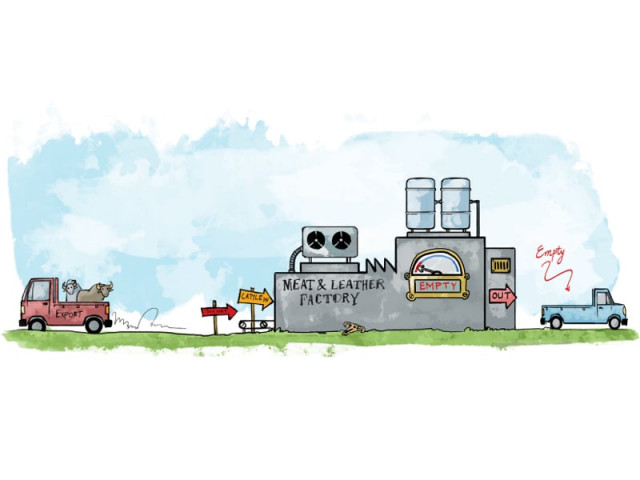Chain reaction: ECC bans export of live animals from October 1
Animal exports earn markedly less than processed meat.

Animal exports earn markedly less than processed meat. ILLUSTRATION: JAMAL KHURSHID
The export of live animals, instead of processed meat, has caused a loss of hundreds of millions of dollars to Pakistan in the last few years and has also pushed up prices of meat and leather in the domestic market.
In the last financial year 2012-13, Pakistan earned $214.5 million on export of processed meat, markedly higher than $20 million earned from export of live animals, sources say.
Earnings from export of by-products through value addition were in addition to these figures.
This disclosure was made in a meeting of the Economic Coordination Committee (ECC) of the cabinet on July 30 this year.
Keeping in view the huge loss because of export of live animals, a representative of the Ministry of Food Security and Research proposed that the government should abandon the low revenue-generating option and slap a ban on animal exports.
The ECC considered a summary submitted by the ministry on the “ban on commercial export of live animals” and decided to impose restrictions on exports with effect from October 1.
Following the ECC decision in March 2009, around 275,000 cattle and 232,424 sheep and goats had been exported to various countries in the last four years. In the meantime, the export of processed beef rose to more than 45,000 tons in the same period.
It was argued in the meeting that the export of processed meat was more advantageous as it fetched better prices in the international market and provided precious by-products such as hides, bones, blood and tallow to many associated industries in the country.
According to a government official, prices of meat have increased sharply in the domestic market in the wake of unchecked export of live animals and said the ban on exports will help in enhancing export of value-added products like meat, meat products and finished leather goods, and bring in foreign exchange.
He pointed out that the export of live animals and smuggling of livestock from Pakistan to Iran, the United Arab Emirates, Afghanistan and other countries had caused acute shortage of raw material for the leather industry and also pushed up meat prices in the country.
Published in The Express Tribune, August 18th, 2013.
Like Business on Facebook, follow @TribuneBiz on Twitter to stay informed and join in the conversation.



















COMMENTS
Comments are moderated and generally will be posted if they are on-topic and not abusive.
For more information, please see our Comments FAQ